Kaimuki, Hawaii
News Item- Powered by MBC NewsMaker
Red Cross The Hawaii Red Cross Urges Residents to Prepare Now for Hurricanes
- Tweet
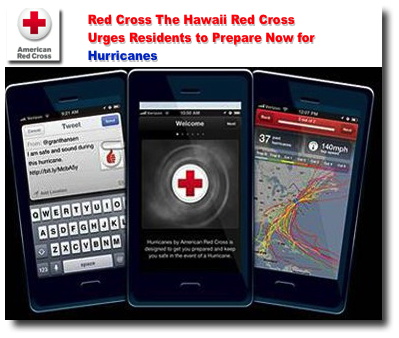
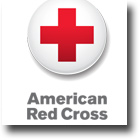
The Hawaii Red Cross Urges Residents
to Prepare Now for Hurricanes
Download the Free Emergency App to Stay Safe
During National Hurricane Preparedness Week, which runs May 24 through May 30, the Hawaii Red Cross is urging families and individuals to get ready today for the storm season ahead. Hurricanes can cause life and property-threatening hazards such a flooding, storm surge, high winds and tornadoes. The Hawaii Red Cross recommends that residents update their family evacuation plan, emergency preparedness kit and get better prepared. Preparation is the best protection against the dangers of a hurricane.
"By taking a few simple actions like making an emergency kit and a family plan, you can prepare for hurricanes and other emergencies," said Coralie Chun Matayoshi, CEO of the Hawaii Red Cross. "Even if you took action to prepare last hurricane season, it's important that you revisit and update your communication plan and check your kit for expired items. Being prepared in advance can be a lifesaving measure when a storm threatens our islands."
The American Red Cross recommends the following preparedness actions:
Download the free Red Cross Emergency app to your mobile device. Emergency is the one-download resource that puts vital information at your fingertips. This "all-inclusive" app combines more than 35 different severe weather and emergency alerts from natural to man-made, giving you real-time information to help keep you and your loved ones safe. Choose the alerts that are important to your location. Monitor activity across the country to know when incidents are about to occur in the locations of your family and friends. Activate "Family Safe" to notify loved ones that an alert has been issued in their area and check to see if they are safe. Access vital information on what to do before, during and after an emergency strikes. Download the app by visiting redcross.org/apps.
Make an emergency preparedness kit:
Your kit should include a portable, sturdy, easy to carry, water resistant container and should have enough supplies for seven days. Check your kit and replace perishable stock every six months. Whether you purchase a kit or choose to build your own, your seven-day kit should include:
- Water - one gallon per person, per day.
- Food - non-perishable, easy-to-prepare items such as tuna fish, peanut butter, crackers, and canned fruit. Make sure to include a manual can opener.
- A battery-powered or hand-crank radio, flashlight and plenty of extra batteries.
- A first aid kit.
- Prescription and non-prescription medication items (seven-day supply). Include medical supplies like extra hearing aid batteries, syringes, etc.
- Copies of important documents, including birth certificates, insurance policies, a medication list and pertinent medical information, proof of address, deed/lease to home and social security cards.
- Cell phone chargers.
- Multi-purpose tool.
- Sanitation and personal hygiene items.
- Extra cash. ATMs and credit cards won't work if the power is out.
- Special items for infant, elderly or disabled family members.
- One blanket or sleeping bag per person.
- Pet supplies (collar, leash, ID, food, carrier, bowls).
Maps of the area.
Prepare a family evacuation plan
The Red Cross urges each and every household to meet together to develop a household disaster plan. The plan should include
- Identifying two meeting places: one right outside your home in case of a sudden emergency, like a fire, and one outside your neighborhood in case you can't return home.
- Making advanced preparations for your pets. Be aware that pets may not be allowed in shelters. Contact hotels, motels, family members and animal shelters to see if they would allow pets in a disaster situation. Keep a contact list of "pet friendly" locations. If you are asked to evacuate, take your pets with you.
- Choosing an out-of-area emergency contact person. During or after a disaster, it's often easier to call long distance, especially if local phone lines are overloaded or out of service. Family members should call this person and tell them where they are. Everyone must know your emergency contact person's phone number and email address.
- Plan your evacuation route. Use local maps and identify alternate evacuation routes from home, work and/or school. Know where you are going and how you plan to get there before you leave home.
Be informed
- Find out what types of disaster are likely to occur in your area and how to prepare for each.
- Find out how local authorities will contact you during a disaster. Listen to local media broadcasts or NOAA Weather Radio for the latest storm conditions and follow the advice of local authorities.
- Contact the Hawaii Red Cross for details about community disaster education presentations that may be arranged or are available in your workplace, school or community organization.
- Get trained in CPR and first aid so you will know how to respond to emergencies in the event that help is delayed.
- If you are told to evacuate, do so immediately. You may choose to evacuate sooner than alerted if you think you may need additional time.
Know what to do if a hurricane WATCH is issued
- Listen to weather updates from your battery-powered or hand-cranked radio.
- Bring in outdoor objects such as lawn furniture, hanging plants, bicycles, toys and garden tools, anchor objects that cannot be brought inside.
- Close all windows and doors. Cover windows with storm shutters or plywood.
- If time permits, and you live in an identified surge zone, elevate furniture or move it to a higher floor to protect it from flooding.
- Fill your vehicle's gas tank.
- Check your disaster supplies kit to make sure items have not expired.
Know what to do if a hurricane WARNING is issued
- Listen to the advice of local officials, and leave if they tell you to do so. To locate the nearest Red Cross emergency shelter, check your hurricane app or visit redcross.org/shelter.
- If in a manufactured home, check tie-downs and evacuate as told by local authorities.
- Secure your home by unplugging appliances.
- Turn your refrigerator and freezer to the coldest setting and keep them closed as much as possible.
- If you have propane, turn off the tank.
- If you are not advised to evacuate, stay inside, away from windows, skylights and glass doors.
- Use flashlights in the dark. Do NOT use open flames, such as candles and kerosene lamps, as a source of light.
- If power is lost, turn off appliances to reduce damage from a power surge when electricity is restored.
For more information on what to do before, during and after a hurricane, please visit redcross.org/prepare/disaster/hurricane.
You can also follow the Hawaii Red Cross on Twitter at @HawaiiRedCross or on Facebook at facebook.com/hawaiiredcross. You can contact the Hawaii Red Cross at 808-734-2101 or visit redcross.org/hawaii. We urge you to share these Red Cross hurricane preparedness tips with every member of your household, because the best protection is to be prepared ahead of time.
<5-26-15 Hurricane Preparedness Week.doc>
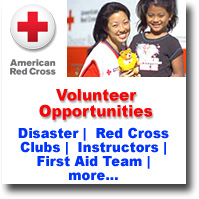 American Red Cross Hawaii Volunteer Opportunities With your help, the promise of neighbor helping neighbor in times of trouble becomes a reality and our communities become safer places to live. Show your aloha and become a volunteer for the American Red Cross in Hawaii. |
ABOUT HAWAII RED CROSS
PROGRAMS & SERVICES Disaster Preparedness
In Hawaii due to our isolation, we encourage all families to be prepared for 7 days instead of 72 hours. It will take time following a disaster for a logistics bridge to be built to Hawaii if our harbors and airports are affected by a major disaster and we may be relying on our own resources longer than other places within the United States. First Aid Station Teams (FAST)
One of the wonderful services your American Red Cross Hawaii provides to its community is manning first aid stations at community events. American Red Cross First Aid Station (FAS) Team stations are staffed with competent volunteers who have been trained to respond. Red Cross Clubs
Participate in a Red Cross Club at the Hawaii State Chapter. Help your community by volunteering, fundraising and supporting the mission of the American Red Cross in Hawaii. Services to the Armed Forces
The American Red Cross provides a vital communication lifeline between military service members and their families by relaying urgent information in times of emergency. TAKE A CLASS The American Red Cross provides lifesaving training to thousands of Hawaii residents each year in numerous topic areas including First Aid/CPR/AED and Babysitting. Aquatics
Count on the American Red Cross for the best training on how to be safe in, on and around the water! Explore the exciting new collection of courses designed to make learning easier and to help you benefit from the latest research on instructional techniques. Disaster Training
We conduct free non-certificate personal preparedness courses for neighborhood and community residents; agency staff and clients; school teachers, staff, parents, and administrators; and local business personnel. Nurse Assistant Training
The American Red Cross Hawaii is committed to adhering to the highest standards of instruction through our Nurse Assistant Training Program. Volunteer
It's what we do. The American Red Cross works within our local communities, providing relief to people who have suffered a disaster. Show your aloha and become a volunteer for the American Red Cross in Hawaii. We invite you to explore the many volunteer opportunities available. Click here to learn more. |

HOURS - Monday - Friday, 8:00 a.m. to 4:00 p.m.
ABOUT US
The American Red Cross in Hawaii prevents and alleviates human suffering in the face of emergencies by mobilizing the power of volunteers and the generosity of donors.
The Hawaii State Chapter provides the following programs and services in the State of Hawaii.
- Disaster Relief
- Safety Training
- Military (Service to the Armed Forces)
- International Services
- Red Cross First Aid Stations
- Community Events and Presentations (speaker requests)
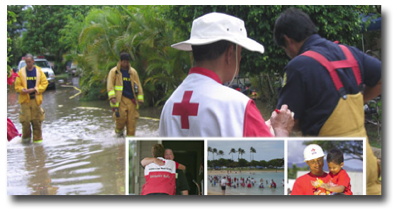
MISSION
The American Red Cross in Hawaii prevents and alleviates human suffering in the face of emergencies by mobilizing the power of volunteers and the generosity of donors.
The Hawaii State Chapter responds continually to large and small disasters throughout the State of Hawaii. The Red Cross is the only volunteer organization charged, by federal Congressional Charter, with responding during disasters to provide for the immediate emergency needs of families and individuals. In addition, the Chapter prepares individuals and businesses to be more prepared for emergencies and to initiate appropriate action to ensure the health and safety of those around them and themselves.
The American Red Cross is not a government agency. We depend on the aloha spirit of giving from our community to help others in need.
Read more about our vision, values and more...
STATEWIDE PRESENCE
The Hawaii State Chapter consists of the Chapter headquarters, offices on Maui, Kauai and Hawaii and four military service centers (Joint Base Pearl Harbor Hickam, Schofield Barracks, Kaneohe Marine Corp Base and Tripler Army Medical Center).
HISTORY
Founded in 1881 by Clara Barton, the American Red Cross is one of the oldest human service organizations in the United States. In 1905, the U.S. Congress chartered the Red Cross to help relieve the suffering caused by disasters. Over the years, we have become part of the very fiber of the community and Americans have grown to expect and rely on our swift, professional assistance through a national volunteer corps of more than 1.44 million people. The American Red Cross is one of more than 145 member nations that comprise the International Red Cross and Red Crescent Societies headquartered in Geneva, Switzerland. Currently, 967 chapters make up the American Red Cross.
Although 1917 is the official date that the first American Red Cross chapter was chartered in Hawaii, Red Cross work began as early as 1898, when some 300 women, including Princess Kaiulani, organized a Red Cross society to aid the sick and wounded soldiers stopping here on transports from the Philippines during the Spanish-American War.
Today, the Hawaii State Chapter is a leader in health and safety training. Red Cross disaster volunteers respond regularly to house and apartment fires, and are prepared for larger disasters like hurricanes, tsunamis, and floods.
Through its extensive use of trained volunteers, the American Red Cross has earned a reputation for being of one of the nation's most efficiently managed non-profit organizations, a distinction that has been recognized by publications such as Forbes, The Chronicle of Philanthropy, Nonprofit Times and Money Magazine. The Hawaii State Chapter of the American Red Cross has over 4,000 volunteers - a volunteer-to-staff ratio of more than 10 to 1.
The Hawaii State Chapter of the American Red Cross is known for excellent stewardship of funds. We have always prided ourselves on providing services that do not duplicate the services of other non-profits organizations and proactively seeking ways to collaborate with other providers.

Sep 14, 1917: Queen Liliuokalani's secretary, Colonel Iaukea, presents a hand-sewn Red Cross flag to members of the local Chapter on the steps of Iolani Palace. This ceremony took place a few months after the Hawaii Chapter was officially chartered. At the Queen's suggestion, the flag flew over the palace and later hung in the Throne Room during World War I. Mrs. Henry Dawson accepts flag. Territorial Governor Lucius Pinkham is behind Iaukea.
View more historical photos
Back to the top
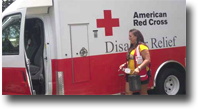
Vision
- ...all people affected by disaster across the country and around the world receive care, shelter and hope;
- ...our communities are ready and prepared for disasters;
- ...everyone in our country has access to safe, lifesaving blood and blood products;
- ...all members of our armed services and their families find support and comfort whenever needed; and
- ...in an emergency, there are always trained individuals nearby, ready to use their Red Cross skills to save lives.
The American Red Cross, through its strong network of volunteers, donors and partners, is always there in times of need. We aspire to turn compassion into action so that
Values
- Compassionate: We are dedicated to improving the lives of those we serve and to treating each other with care and respect.
- Collaborative: We work together as One Red Cross family, in partnership with other organizations, and always embrace diversity and inclusiveness.
- Creative: We seek new ideas, are open to change and always look for better ways to serve those in need.
- Credible: We act with integrity, are transparent guardians of the public trust and honor our promises.
- Committed: We hold ourselves accountable for defining and meeting clear objectives, delivering on our mission and carefully stewarding our donor funds.
Local Training and Preparedness
- Lifesaving training to almost 20,000 people per year (CPR, first aid, aquatics, babysitting, pet first aid, and nurse aide training)
- Free Annual Summer Swim program for over 45 years at Ala Moana Beach for hundreds of keiki and adults, and a volunteer teen Summer Buddies leadership program.
- Workplace Safety teaches workers how to prevent injuries and respond to life threatening emergencies
- Caregiving teaches families to care for loved ones at home, or in a career to care for sick, elderly and disabled in a care setting.
- Disaster preparedness information was shared with over 27,000 people on how to prepare for emergencies
- Pre-deployment briefings provided to 17,000 servicemen and families
Relevance of Red Cross in Hawaii
- With the threat of flu pandemic, terrorist attacks, and major natural and man-made disasters, the American Red Cross is more relevant and necessary than ever before. It is not "if," but "when" a major disaster in Hawaii will occur, and with your help, we'll be ready.
- The Red Cross is not a government agency. All disaster training and services are free, made possible by generous donations from local individuals and businesses and our dedicated volunteers.
Questions? Ready for an appointment?

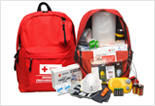
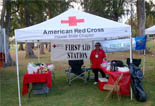
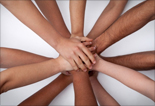
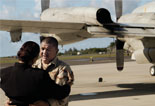
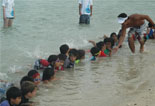
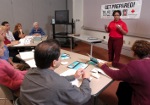

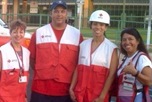


 American Red Cross, Hawaii State Chapter
American Red Cross, Hawaii State Chapter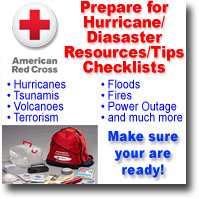
 Kaimuki Hawaii.Com Home Page
Kaimuki Hawaii.Com Home Page Featured Sponsors
Featured Sponsors
 Calendar
Calendar Kaimuki Hawaii Featured Pages
Kaimuki Hawaii Featured Pages